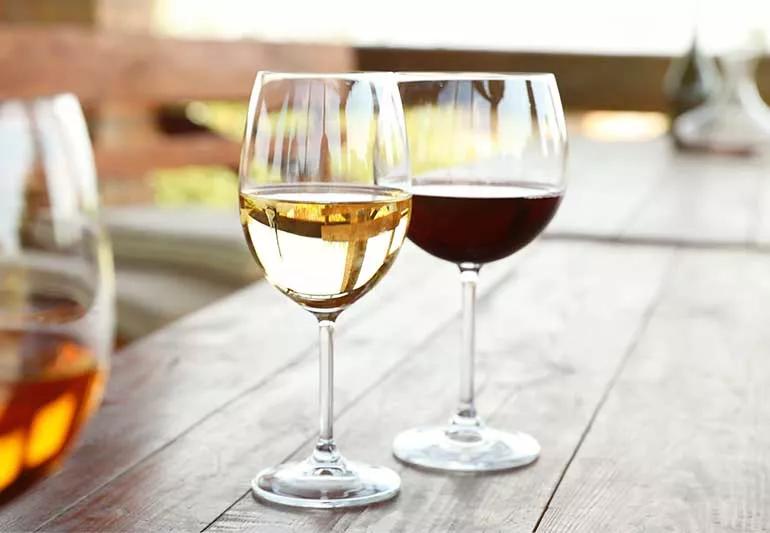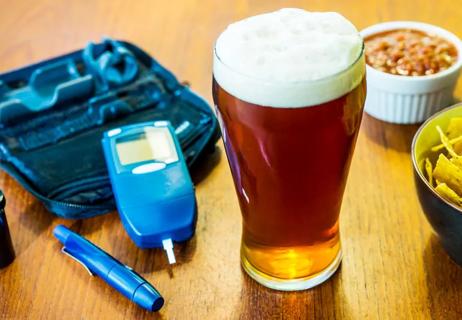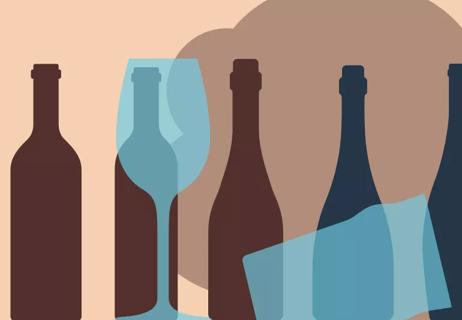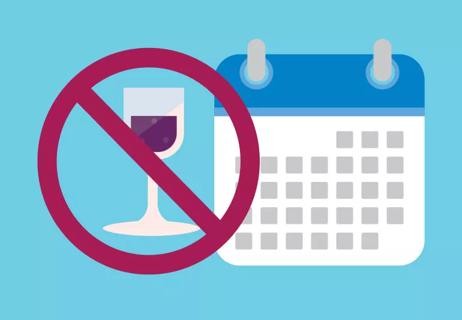No alcohol is actually ‘healthy,’ but some drinks may be less harmful than others

What are you drinking tonight? As the bartender awaits an answer, your mind and taste buds consider the variety of alcohol options available. Beer? Wine? Some sort of boozy mixed cocktail?
Advertisement
Cleveland Clinic is a non-profit academic medical center. Advertising on our site helps support our mission. We do not endorse non-Cleveland Clinic products or services. Policy
Whatever you order, odds are you’re NOT making the decision based on the drink’s potential health benefits. There’s little to no nutritional value in alcohol, after all — and we know it can cause a literal headache.
But there are drink choices that are better than others when it comes to calories, sugar content and how you might feel the next morning.
So, let’s put a healthier drink order in with help from registered dietitian Julia Zumpano, RD, LD.
Video content: This video is available to watch online.
View video online (https://www.youtube.com/embed/Z1I_H80IluU?si=Cv62F1HcC1OBJCcS)
The answer to that question is simple: No. In fact, the World Health Organization (WHO) published the following statement in 2023: “When it comes to alcohol consumption, there is no safe amount that does not affect health.”
The truth is that alcohol is a toxic and addictive substance associated with numerous negative health issues. (Please disregard any clickbait headlines that label beer, wine or spirits as body-boosting tonics.)
“Nobody would recommend that you start drinking alcohol to improve your health,” says Zumpano. “It can have adverse effects on your liver, heart, brain, gut and more.”
But alcohol also is a part of our culture. It’s estimated that more than 2 billion people around the world tip back an adult beverage from time to time. Bottom line? Alcohol isn’t disappearing anytime soon.
Advertisement
So, if you’re going to drink, let’s explore options that may be a little less bad for you.
Light beer is the right beer if you’re looking to minimize calories and carbohydrates, a dietary combo that can lead to weight gain. (There’s a reason why a rounded midsection is often dubbed a “beer belly,” after all.)
Many light beers come in around 50 to 100 calories with only a handful of carbs. Regular beers often start around 150 calories with carb counts sitting reaching double digits. Higher-alcohol brews (such as IPAs) can come in closer to 300 calories and added carbs.
Now, if you’re drinking one beer, the difference between light and regular doesn’t mean much.
“But most people don’t stop at one,” notes Zumpano. “Health concerns grow when you start multiplying those extra calories, carbs and alcohol content — especially if you’re doing that sort of math regularly.”
If there’s one type of alcohol that routinely generates good-for-you headlines, it’s red wine. Studies have even shown a relationship between moderate consumption of red wine and a healthier heart.
The reason why involves resveratrol, an antioxidant found in grape skin. Research suggests that resveratrol may help reduce cholesterol, lower blood pressure and prevent cardiovascular disease.
Selecting a dry red wine typically limits sugars, too, which cuts the calorie and carb count, says Zumpano. (A drier white wine also tends to have fewer calories and carbs but without as much resveratrol.)
A word of caution about red wines, though: The grape skins that bring resveratrol also come with tannins, a chemical compound that can cause headaches.
Clear liquor options may leave you with a clearer head the next day.
Darker liquors (such as bourbon) gain color and taste from impurities known as congeners. Why is that important? Well, it seems that congeners can lead to a particularly wicked hangover, says Zumpano.
(It should be noted that congeners are in all alcohol, given that they’re a byproduct of the fermentation and distillation process. Darker liquors just have more.)
When it comes to calories and carbs, most spirits — vodka, gin, rum, tequila, whisky, etc. — have similar numbers. But those counts can skyrocket if you use sugary mixers to make a cocktail. “Mixed drinks can be packed with calories,” states Zumpano.
So, don’t go overboard on umbrella drinks.
So, what would be a healthier drink order? Zumpano offers these five options:
Advertisement
Alcohol isn’t really healthy to drink in any amount, so it’s safe to say consuming vast quantities is really, really bad for you.
The federal Dietary Guidelines for Americans, 2020-2025 recommends that daily consumption of alcoholic beverages not exceed one drink a day for women or two drinks a day for men. A drink is defined as:
“In general, how much you drink is more important than the type of alcohol you choose,” says Zumpano. “So, whatever your drink of choice is, enjoy it in moderation.”
Advertisement
Learn more about our editorial process.
Advertisement

The answer is ‘yes,’ with a noticeable trend toward healthier living — but there’s a caveat

Drinking during the day can result in drinking more than usual and worsen your sleep cycle

Blood glucose monitoring and drinking in moderation can help you avoid hypoglycemia

Excess alcohol and substance use can cause temporary and permanent memory loss

Your liver, heart and skin will all thank you for the break from alcohol

The flu, RSV, COVID-19, pneumonia and more typically circulate during cold weather months. I added this change

Type 2 diabetes isn’t inevitable with these dietary changes

Applying a hot or cold compress can help with pain